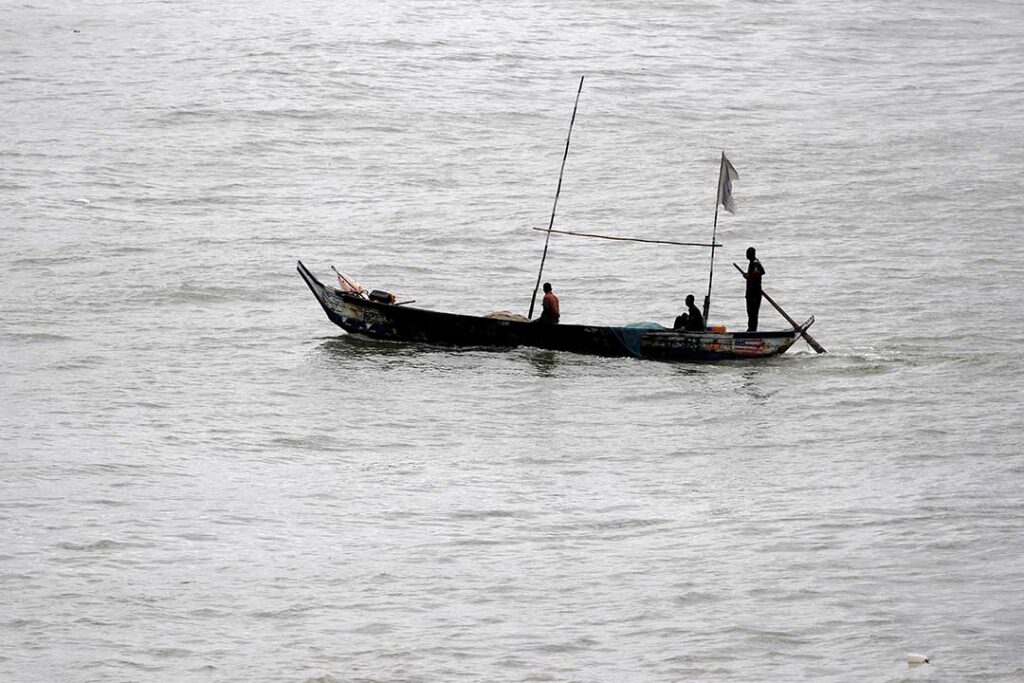ADF STAFF
To prevent further decline of fish stocks in the Gulf of Guinea, Ghana recently urged neighboring countries to implement coordinated closed fishing seasons.
Paul Odartei Bannerman, deputy executive director of Ghana’s Fisheries Commission, made the plea during the Conference of Ministers of the Fisheries Committee for West Central Gulf of Guinea (FCWC) in mid-December. Representatives from Benin, Côte d’Ivoire, Liberia, Nigeria and Togo attended the conference.
Bannerman said he believed the impact to fish stocks in the region would be insignificant if only Ghana observed a closed season, according to a report by Ghanaian newspaper Daily Graphic. Bannerman added that closed fishing seasons in other parts of the world have proved effective in protecting fish populations.
Bannerman blamed illegal, unreported and unregulated (IUU) fishing for the region’s plummeting fish populations. Ghana has imposed closed fishing seasons of two months for industrial fishermen and one month for artisanal fishermen since 2019.
Godfrey Baidoo-Tsibu, the FCWC’s regional monitoring, control and surveillance coordinator, acknowledged during the conference that the region’s most important fish stocks “are fully exploited or over exploited due to overcapacity, overfishing and IUU,” according to a report by the Daily Graphic.
Ghana’s small pelagic fish populations, such as sardinella, have dropped 80% in the past two decades. One species, sardinella aurita, is fully collapsed. Chinese industrial fishing trawlers are responsible for catching most of Ghana’s fish. China is the world’s worst IUU offender, according to IUU Fishing Index.
While representatives from the other FCWC countries sought to better understand what effects Ghana’s closed season had on the fisheries sector, Kofi Agbogah, executive director of Hen Mpoano, a Ghanaian based nongovernmental organization that focuses on fisheries, urged the countries to immediately enact closed seasons, the Daily Graphic reported.
“We have to start the closed season whether we have scientific data or not,” Agbogah said in the report.
Steve Trent, executive director of the Environmental Justice Foundation, which has worked to preserve fish stocks and combat IUU fishing in the region, acknowledged that it is difficult for any one nation to preserve fish stocks via a closed fishing season because many species are inherently migratory.
But he blamed industrial trawlers as the main culprit in decimating fish populations. If a closed season is enacted in one country, industrial trawlers often simply sail to the waters of nearby nations where closed seasons don’t exist.
“Scientifically informed and well-enforced closed seasons are one tool that can aid the recovery of fish populations,” Trent told ADF in an email. “Logic would suggest that a regional approach to these where possible may stop the issue of vessels simply moving to neighboring countries. However useful closed seasons may be in the short term, ultimately the aim should be to drastically reduce the presence of industrial trawlers operating in West Africa year-round and eliminating harmful illegal fishing through increased transparency.”
An Unintended Consequence
Ghana’s closed fishing seasons have had an unintended consequence for those who rely on fishing for food and income. The action led to increased household hunger and a lack of dietary diversity in the country, according to the U.S. Agency for International Development’s Sustainable Fisheries Management Project.
Many artisanal fisherman in Ghana do not receive financial assistance from the government when their fishing season is abbreviated.
Trent argued that closed seasons should primarily target industrial trawlers, which are a greater threat to fish stocks because they catch a far larger amount of fish than artisanal boats.
“Any closures aimed at small-scale fishing operations would have to be done alongside prompt and sufficient fiscal support for families,” Trent told ADF. “Acute poverty exists across many of the coastal communities in West Africa — which would only be exacerbated by a prolonged period without being able to catch, process and trade fish.”
Failure to implement and coordinate closed seasons would likely aggravate the declining catches already being observed in West Africa, he added.

